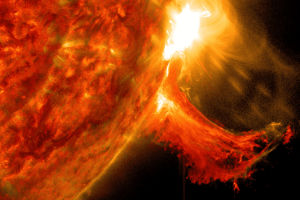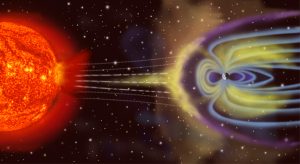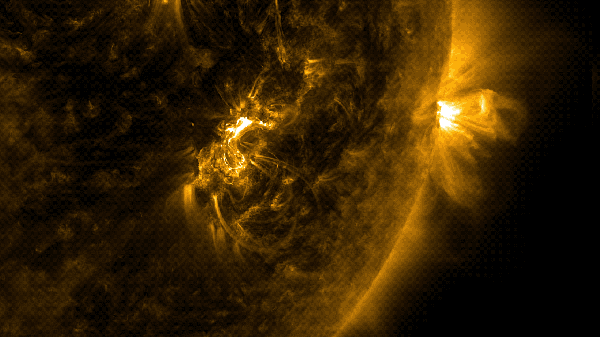Introduction
The universe, with its countless celestial bodies and phenomena, continually fascinates and challenges us. Among these awe-inspiring events, solar flares stand out as captivating yet potentially impactful occurrences. These eruptions from the sun’s surface not only showcase the might of our closest star but also wield the power to influence space weather, posing implications for our technological infrastructure and even life on Earth.
Understanding Solar Flares
Solar flares are intense bursts of energy and radiation originating from the sun’s surface. They occur due to magnetic reconnection—a process wherein magnetic fields within the solar atmosphere realign, releasing an enormous amount of energy in the form of light, heat, and accelerated particles.
Anatomy of a Solar Flare
Trigger Event: Flares often start near sunspots, which are regions of concentrated magnetic fields on the sun’s surface.
Energy Release: Magnetic energy builds up, leading to sudden reconfiguration of magnetic field lines.
Eruption: The release of stored energy generates powerful radiation across the electromagnetic spectrum.
Particle Acceleration: High-energy particles, such as electrons and protons, are accelerated to nearly the speed of light.
Classification of Solar Flares
Scientists categorize solar flares based on their X-ray brightness, which correlates with their energy output. The classification system, known as the ‘X-ray flare classes,’ ranges from A (the weakest) to X (the strongest). Each class further divides into numerical subcategories, providing a detailed scale of flare intensity.

Impact on Space Weather
Solar flares and their associated phenomena, like coronal mass ejections (CMEs), significantly influence space weather—affecting the space environment and technological systems both near Earth and throughout the solar system.
Effects on Earth
Radiation Hazard: Solar flares emit high-energy radiation that can pose risks to astronauts in space and even interfere with satellites and communication systems on Earth.
Geomagnetic Storms: CMEs often accompany solar flares, releasing charged particles into space. When these particles interact with Earth’s magnetic field, they can cause geomagnetic storms, potentially disrupting power grids, satellite operations, and GPS systems.

Impact on Technology
Satellite Operations: Flares and associated geomagnetic storms can affect satellite electronics, causing communication interruptions and even equipment damage.
Power Grid Vulnerability: Geomagnetic storms induced by solar activity pose a threat to power grids, with potential wide-scale blackouts if adequate protective measures aren’t in place.
Predicting and Mitigating Risks
Advancements in solar observation and predictive models have enabled better forecasting of solar flares and their potential impacts. Organizations like NASA and NOAA constantly monitor the sun’s activity, issuing alerts and warnings about imminent solar events. Mitigation strategies include:
Early Warning Systems: Providing alerts to spacecraft operators, power grid managers, and communication networks to prepare for possible impacts.
Spacecraft Shielding: Designing spacecraft with robust shielding to withstand radiation and mitigate the effects of solar flares.
Grid Protection Measures: Implementing safeguards in power grids to minimize the risk of widespread outages during severe space weather events.

Conclusion
Solar flares, mesmerizing and powerful eruptions from the sun, hold the key to understanding space weather and its impact on our technological infrastructure and planet. As we continue to delve deeper into the science behind these solar phenomena, our ability to predict and mitigate their effects grows, ensuring the safety and resilience of our increasingly interconnected world in the face of these cosmic events.




